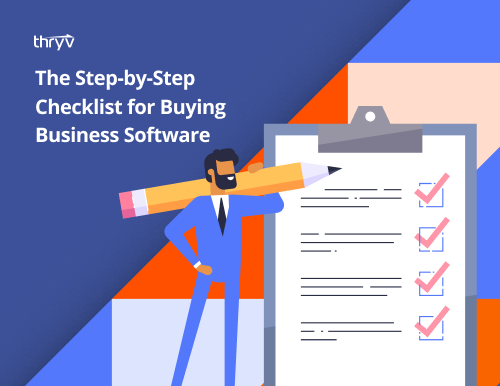For small businesses, reputation is everything. A strong online reputation attracts customers, builds trust, and grows your business. However, managing reviews, responding to customer feedback, and keeping up with social media can be overwhelming. That’s where white-label reputation management software comes into play.
Before we dive in, you might wonder what “white label” means. White-label software is built by one company, but other companies can rebrand it and That’s where white-label reputation management software comes into play.resell it as their own. This means marketing agencies and businesses can offer reputation management services under their name without building software from scratch.

Free Guide: Buying Software Checklist
With so many software options, we’ll help you determine which tools are right for your small business and how to choose the best ones in this free ebook.
Download
In this guide, we’ll review 11 of the best white-label reputation management software for businesses to help them monitor and improve their online presence.
Best White Label Reputation Management Software
- Thryv
- BirdEye
- Podium
- Yext
- ReviewTrackers
- Grade.us
- RepuGen
- NiceJob
- Reputation.com
- Swell
- LocalClarity
1. Thryv
Thryv includes a robust reputation management tool that monitors online reviews, responds to feedback, and requests new reviews — all in one place.
Beyond reputation management, Thryv helps businesses maintain a positive reputation by automatically requesting reviews via text and email. The platform consolidates feedback from multiple sites, such as Google, Facebook, and Yelp, making it easy to track sentiment and respond quickly. Businesses can also set up alerts for new reviews, ensuring they never miss important comments.
Thryv also provides in-depth analytics that measure reputation over time and identify areas for improvement. By centralizing reputation management with other tools like CRM and marketing automation, Thryv simplifies operations and helps businesses build a stronger online presence.
Key Features
- Review monitoring across multiple platforms like Google, Facebook, and Yelp
- Automated review requests via email and text
- Robust set of business and marketing tools
Pros
- There’s an easy-to-use dashboard for managing reviews.
- Strong automation features for requesting reviews.
- It has a complete business management suite beyond reputation management.
Cons
- Thryv is made for small businesses; larger companies might experience limitations.
Pricing: $228/month for Marketing Center and Business Center.
2. BirdEye
Birdeye provides comprehensive reputation management software that prioritizes online reviews, customer feedback, and local business visibility. It’s a well-known platform that helps businesses collect, monitor, and respond to customers online.
BirdEye also includes customer surveys and messaging tools that allow companies to monitor and respond to reviews across multiple platforms, such as Google, Facebook, and industry-specific review sites. You can solicit specific customer feedback that strengthens your online profiles and improves your SEO.
Key Features
- Review monitoring and response tools
- AI-driven review insights and analytics
- AI that reads customer reviews
Pros
- BirdEye offers strong automation for review generation.
- There’s an intuitive dashboard with real-time alerts.
- It integrates with over 1,000 business apps, making it easier for businesses to use.
Cons
- The setup process can be complex.
- Some features are only available on premium plans.
Pricing: Contact for pricing
3. Podium
Podium is a business management software that improves customer interactions, gathers online reviews, and enhances client messaging. It makes it easy for companies to communicate with customers and collect reviews via text.
Podium improves your online reputation by making it easier to request, manage, and respond to customer feedback – all from a centralized dashboard. Since it relies heavily on SMS, it’s ideal for local businesses, service providers, and multi-location franchises to communicate with customers on the go.
Key Features
- Text-based review requests
- Real-time review monitoring
- Gathers direct feedback from customers
Pros
- Podium is easy to use for both businesses and customers.
- This software has a strong emphasis on mobile-friendly communication.
- It integrates with multiple payment processing tools.
Cons
- There are limited social media management features.
- No built-in survey tools.
Pricing: Contact for pricing
4. Yext
Yext is a powerful reputation management tool designed to help businesses control their online presence. It ensures that business information — such as name, address, phone number, and hours — is accurate and consistent across various directories (such as Yelp, Angi, Google Business, etc.), search engines, and social media.
Beyond listing management, Yext provides real-time review monitoring, allowing you to track customer feedback in a single dashboard. It also enables automated review responses and AI-powered sentiment analysis, helping companies understand client opinions and improve customer service.
Key Features
- Automated listing updates.
- AI-powered review monitoring
- Improves search engine visibility
Pros
- Excellent for businesses that need listing management.
- There are strong analytics and reporting features.
- Yext automates review monitoring and responses.
Cons
- Yext is more focused on listings than direct review management.
- Some advanced features require additional subscriptions.
Pricing: Contact for pricing
5. ReviewTrackers
ReviewTrackers is a reputation management platform that helps businesses collect, monitor, and analyze customer feedback. It provides a centralized dashboard where you can track customer sentiment, respond to reviews in real-time, and gain insights into trends affecting your brand’s reputation.
ReviewTrackers also offers competitive benchmarking for companies managing multiple locations like franchises. It lets them compare ratings and feedback with competitors’. With its customizable reporting tools, you can track performance over time and make data-driven decisions to strengthen your online reputation.
Key Features
- Automated review requests
- Centralized dashboard for managing reviews
- AI-driven sentiment analysis
Pros
- This software has strong reporting and analytics features.
- It’s easy to set up and integrate with other tools.
- ReviewTrackers offers reliable customer support.
Cons
- There are limited social media monitoring tools.
- No built-in messaging features.
Pricing: Contact for pricing
6. Grade.us
Grade.us is a simple yet powerful reputation management platform that automates review requests and manages online reviews. Its widgets showcase positive reviews on your website, boosting your credibility and building customer trust. With detailed reporting and analytics, users can track trends, identify areas for improvement, and make data-driven decisions to strengthen their online reputation.
Key Features
- Automated review generation campaigns
- Review widgets to showcase positive reviews
- Multi-location review tracking
Pros
- Grade.us offers affordable pricing for small businesses.
- It has customizable automations for review generation.
- This software provides an easy-to-use interface that’s ideal for beginners.
Cons
- There are limited social media integrations.
- No built-in messaging tools.
Pricing: $110/month for Solo; $180/month for Professional; $400/month for Agency; $2,500/month for Partner
7. RepuGen
RepuGen helps businesses track and improve customer satisfaction through automated review requests and analytics. One key feature is its AI-driven sentiment analysis tool that identifies customer feedback trends and pinpoints areas for improvement.
Additionally, this software offers patient and client satisfaction tracking, making it particularly popular with healthcare companies. With detailed analytics and reporting, businesses can quickly measure customer sentiment, address concerns, and identify channels your customers engage with most.
Key Features
- AI-driven review sentiment analysis
- Automated feedback collection
- Patient referral tools
Pros
- This software focuses on improving customer experience.
- It has strong reporting tools, which is ideal for small business owners.
- It’s easy to set up and learn how to use.
Cons
- There are limited integrations with other software.
- No built-in social media management.
Pricing: Contact for pricing
Market and Grow Your Business More Effectively With Marketing Center
Marketing Center helps you attract new customers to your business and shows you which marketing strategies work best for your customers so you don’t waste time and money on the wrong tactics.

8. NiceJob
NiceJob is a white label reputation management platform that helps businesses generate positive reviews. It automates requesting and collecting customer feedback, making it easier for companies to boost their online reputations without additional effort.
Beyond review generation, NiceJob offers widgets that display customer testimonials on your website and an SEO-optimized microsite that automatically showcases top reviews. The microsite is a small, standalone website designed to rank in search engines. It focuses on specific keywords, content, and user experience to drive targeted traffic.
Key Features
- Automated review requests.
- Website widgets to showcase testimonials.
- Custom branding options.
Pros
- NiceJob offers a simple setup and plenty of automations.
- The microsite has features that convert website visitors into customers.
Cons
- Limited analytics, which makes it difficult to measure performance.
- No email marketing integrations.
Pricing: $75/month for Reviews; $125/month for Pro
9. Reputation.com
Reputation.com is another white label platform that helps businesses monitor, manage, and improve their online presence. It offers AI-powered analytics to track customer sentiment and can analyze reviews, surveys, and social media, providing insights into your brand’s reputation.
The platform’s review management tools work with major sites like Google and Facebook. With its data-driven approach, Reputation.com is ideal for companies looking to strengthen customer trust, improve brand perception, and streamline reputation management in one platform.
Key Features
- AI-powered review monitoring
- Social media and listing management
- Customizable branding
Pros
- Reputation.com has enterprise-level features that support growing businesses.
- There are plenty of data insights that measure performance.
- Reputation.com offers multi-location support.
Cons
- Some features are complex and require time to learn how to use them.
- Some enterprise-level features may not be as useful for small business owners.
Pricing: Contact for pricing
10. Swell
Swell provides a streamlined reputation management solution for healthcare practices that want to improve patient engagement. By automating review collection, Swell boosts visibility for your practice and increases your credibility with minimal effort.
Its reputation monitoring offers real-time tracking across multiple locations, helping businesses analyze trends and improve patient experiences. Centralizing feedback from various sites allows prompt and professional replies with templated responses. With these features, Swell simplifies reputation management, helping healthcare providers build trust, enhance patient relationships, and maintain a strong online presence.
Key Features
- Automated review invitations
- Real-time reputation monitoring
- Seamless integration with healthcare systems.
Pros
- Swell is an easy-to-use platform with automated review requests.
- Swell offers patient engagement features through text and email.
- The centralized review management system is great for quick responses.
Cons
- Primarily designed for healthcare, limiting broader industry use.
- Advanced features may require training to maximize benefits.
Pricing: Contact for pricing
11. LocalClarity
LocalClarity is a powerful reputation management platform designed for multi-location businesses. The platform allows businesses to efficiently monitor, manage, and respond to customer reviews across multiple locations from a single dashboard.
With its focus on scalability, LocalClarity is particularly beneficial for franchises, agencies, and enterprises that need a streamlined solution to maintain brand reputation across various platforms, such as Google, Facebook, and industry-specific review sites. The platform also includes local search optimization tools, ensuring accurate business listings and improved visibility in search results.
Key Features
- Bulk review response management
- Advanced review analytics
- Local search optimization
Pros
- Ideal for multi-location businesses, franchises, and agencies.
- There is detailed reporting and analytics for data-driven decisions.
- Streamlined review management from a single dashboard.
Cons
- No built-in review generation tools.
- Lacks AI-powered sentiment analysis.
Pricing: Free for Solo; $8/location for Google Only; $16/location for Professional; Custom pricing for Enterprise
Manage Your Reputation Today
Reputation management is crucial for businesses looking to build trust and attract customers. Investing in the right white-label reputation management software can help companies enhance their services and increase customer engagement. Use this list to help you get started and save the guide below for a checklist of things to look for in reputation management software.



